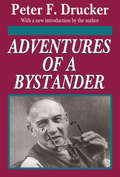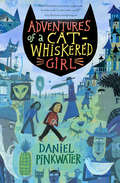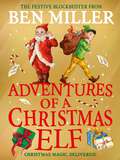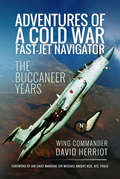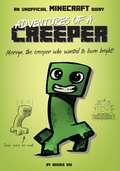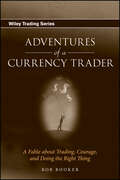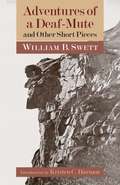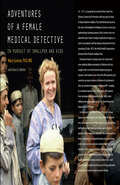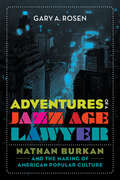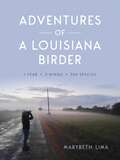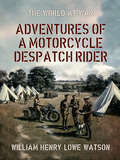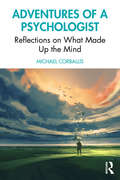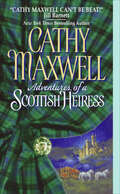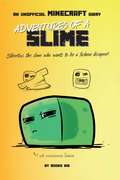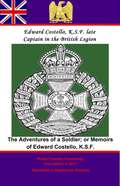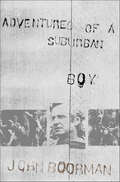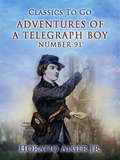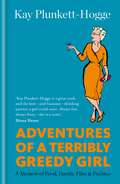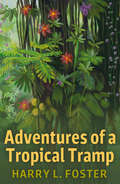- Table View
- List View
Adventures of a Bystander
by Peter DruckerPeter Drucker's lively and thoughtful memoirs are now available in paperback with a new introduction by the author. He writes with wit and spirit about people he has encountered in a long and varied life, including Sigmund Freud, Henry Luce, Alfred Sloan, John L. Lewis, and Marshall McLuhan. After beginning with his childhood in Vienna during and after World War I, Drucker moves on to Europe in the 1920s and early 1930s, describing the imminent doom posed by Hitler and the Nazis. He then goes on to describe London during the 1930s, America during the New Deal era, the World War II years, and beyond.According to John Brooks of The New York Times Book Review, "Peter Drucker is at a corner cafe, delightfully regaling anyone who will listen with tales of what must be one of the more varied—and for a practitioner of such a narrow skill as that of management counseling, astonishing—of contemporary professional lives." Dorothy Rabinowitz of the Washington Post writes, "The famous are here as well as the infamous.... All are the beneficiaries, for better or for worse, of Drucker's unerring eye for psychological detail, his remorseless curiosity, and his imaginative sympathy.... Drucker's book appears in a stroke to have restored the art of the memoir and of the essay."Adventures of a Bystander reflects Drucker's vitality, infinite curiosity, and interest in people, ideas, and the forces behind them. His book is a personal and informal account of the rich life of an independent man of letters, a life that spans eight decades and two continents. It will be of interest to scholars and professionals in the business world, historians, sociologists, and admirers of Peter Drucker.
Adventures of a Bystander (Trailblazers Ser. #Vol. 2)
by Peter DruckerPeter Drucker's lively and thoughtful memoirs are now available in paperback with a new introduction by the author. He writes with wit and spirit about people he has encountered in a long and varied life, including Sigmund Freud, Henry Luce, Alfred Sloan, John L. Lewis, and Marshall McLuhan. After beginning with his childhood in Vienna during and after World War I, Drucker moves on to Europe in the 1920s and early 1930s, describing the imminent doom posed by Hitler and the Nazis. He then goes on to describe London during the 1930s, America during the New Deal era, the World War II years, and beyond. According to John Brooks of The New York Times Book Review, "Peter Drucker is at a corner cafe, delightfully regaling anyone who will listen with tales of what must be one of the more varied—and for a practitioner of such a narrow skill as that of management counseling, astonishing—of contemporary professional lives." Dorothy Rabinowitz of the Washington Post writes, "The famous are here as well as the infamous.... All are the beneficiaries, for better or for worse, of Drucker's unerring eye for psychological detail, his remorseless curiosity, and his imaginative sympathy.... Drucker's book appears in a stroke to have restored the art of the memoir and of the essay." Adventures of a Bystander reflects Drucker's vitality, infinite curiosity, and interest in people, ideas, and the forces behind them. His book is a personal and informal account of the rich life of an independent man of letters, a life that spans eight decades and two continents. It will be of interest to scholars and professionals in the business world, historians, sociologists, and admirers of Peter Drucker.
Adventures of a Cat-Whiskered Girl
by Daniel PinkwaterBig Audrey is a girl . . . with cat's whiskers . . . and sort of cat's eyes. But, is there an other cat-whiskered, sort of cat-eyed girl? Big Audrey waves goodbye to her friends Iggy and Neddie, Seamus, and Crazy Wig, in Los Angeles and hitches a ride with bongo-playing-while-driving Marlon Brando across the country to Poughkeepsie, New York, city of mystery. She finds she has questions needing answers--and a bit of inter-plane-of-existence traveling to do. Big Audrey and her telepathic friend Molly zigzag off on an incredibly strange and kooky adventure, and solve the mystery of the cat-whiskered doppelganger.
Adventures of a Christmas Elf: The perfect festive family gift from Chief Elf and million-copy selling Ben Miller (Christmas Elf Chronicles #3)
by Ben MillerDiscover the joy of gift giving and meet Santa himself in the perfect stocking filler from the million-copy selling actor, author and comedian, Ben Miller.'Wonderful, funny, magical' Chris Evans'Bubbles with warmth and mischievous humour . . . irresistible' Alexander Armstrong Father Christmas needs a holiday. He isn't feeling well and someone seems determined to ruin the festivities. It's up to Christmas Elves, Tog and Holly, to find a way to deliver the presents on time and bring the Christmas magic back for everyone. A laugh-out-loud race against time from Ben Miller! Discover the magic of life as a Christmas Elf in all three laugh-out-loud stories that will take you round the world on Santa&’s sleigh, including Diary of a Christmas Elf and Secrets of a Christmas Elf. Create the perfect festive bookshelf for all the family with Chief Elf, Ben Miller: Meet Santa himself in The Night I Met Father Christmas, a brand-new picture book for 3+ readers, illustrated by Elisa Paganelli. Join the toy workshop as a Christmas Elf in all three pocket-sized stocking fillers for 7+ readers: Diary of a Christmas Elf, Secrets of a Christmas Elf, and Adventures of a Christmas Elf. See where it all began, in Ben Miller's first ever novel, The Night I Met Father Christmas, a classic festive read for 8+ readers.
Adventures of a Cold War Fast-Jet Navigator: The Buccaneer Years
by David HerriotDavid Herriot served almost 40 years in the Royal Air Force as a navigator, first on the Buccaneer S2 and subsequently on the Tornado GR1. This volume recounts his early career operating the Buccaneer on three operational flying tours plus a tour as an instructor on the Operational Conversion Unit. With almost 2500 hours on an aircraft that was operated at high-speed, in all weathers and at ultra low-level, his task in the rear seat was a demanding one. But Herriot was more than just the guy in the back of a Buccaneer; he was, quite routinely, and often to the exasperation of his seniors, the life and soul of any party that was taking place either at home base or when overseas defending the flanks of NATO.This is an epic adventure for the aviation enthusiast, particularly those with affection for the Blackburn Buccaneer, and is one that provides a great deal more than the usual introduction to a specific aircraft type and the people who flew it. Here the reader will find an absolute insight into life on a fast jet squadron, at work and mischievous play during the Cold War and they will be introduced to some of the modern Royal Air Forces greatest characters.
Adventures of a Continental Drifter: An Around-the-World Excursion into Weirdness, Danger, Lust, and the Perils of Street Food
by Elliott HesterIn October 2002, Elliott Hester sold his car, abandoned his apartment, and took off alone on a trip around the world, during which he drifted to over fifty destinations. Elliott's tales about his travels range from the bizarre to the hilarious to the flat-out shocking. Travel with him as he:· Chases off transvestites in the South Pacific· Gets drunk on Estonian moonshine at the maker's eightieth birthday party· Impersonates Samuel L. Jackson at the 38th International Film Festival in the Czech Republic · Ponders the Finnish tradition of sprinting from steamy sauna to plunge into the frigid Baltic Sea—naked!· And much more.Only an around-the-world excursion could produce such outlandish, hair-raising, hysterical adventures. And only Elliott Hester could make such vivid observations and write such vibrant insights about life---and people---on the road.
Adventures of a Creeper: An Unofficial Minecraft Diary (Minecraft #1)
by Books KidIn this humorous, illustrated chapter-book diary, you’ll find out that life is not always a blast—even if you’re an exploding Minecraft creeper!Minecraft creeper Mervyn Miles has just one goal: to win the annual Creeper Combustion and Confusion Competition so his father will finally be proud of him. But, between family and school pressures and bullying by arch-rival Wesley, things turn out to be more difficult than Mervyn could have ever imagined. Read all about this little green monster’s quest to become the biggest exploder in the entire Overworld in this humorous, unofficial Minecraft chapter-book diary with black-and-white illustrations.
Adventures of a Currency Trader
by Rob BookerPraise for ADVENTURES of a CURRENCY TRADER "A truly easy, unique, and enjoyable read! Rob has done it once again to teach us in the funniest way possible how not to make the most common trading mistakes. If you are tired of reading how-to books, this is perfect for you. I highly recommend this book to all traders. Everyone will learn something about themselves by reading this book. " -Kathy Lien, author, Day Trading the Currency Market, and Chief Strategist, www. dailyfx. com "Adventures of a Currency Trader is a must read for anyone who has ever traded or is thinking about trading in the Forex markets. Rob Booker has a unique way of taking years of market knowledge and transforming it into an educational and entertaining experience. It has quickly become a cult classic in my trading library!" -H. Jack Bouroudjian, Principal, Brewer Investment Group "Brilliant! Rob's humor and humanity shine through in this parable about trading and life. Filled with wisdom and wit, it's an exhilarating rollercoaster ride through the peaks and valleys of the learning curve, with many valuable lessons learned along the way. " -Ed Ponsi, President, FXEducator. com "Rob's fable of everyman 'Harry Banes' is destined to become a trading classic. This is both the missing piece and the foundation that comes before the strategies and methodologies. The search for the Holy Grail begins and ends in the heart and mind. The journey is authentic and real and if you're willing to take it with Rob, you will be rewarded in the end. Seldom has psychology and wisdom been so entertaining!" -Raghee Horner, trader and author of Forex Trading for Maximum Profit and Days of Forex Trading "In a series of insightful and entertaining vignettes, Rob Booker teaches both the novice and the experienced trader some hard won truths about the currency market. It's a must read book written by a guy who survived the trenches and went on to prosper in the biggest and most competitive financial market in the world. " -Boris Schlossberg, Senior Currency Strategist, Forex Capital Markets LLC, and author of Technical Analysis of the Currency Market
Adventures of a Deaf-Mute and Other Short Pieces
by Kristen C. Harmon William B. SwettIn Adventures of a Deaf-Mute, Deaf New Englander William B. Swett recounts his adventures in the White Mountains of New Hampshire in the late 1860s. Given to us in short, energetic episodes, Swett tells daring stories of narrow escapes from death and other perilous experiences during his time as a handyman and guide at the Profile House, a hotel named for the nearby Old Man of the Mountain rock formation. A popular destination, the hotel attracted myriad guests, and Swett’s tales of rugged endurance are accompanied by keen observations of the people he meets. Confident in his identity as a Deaf “mute,” he notes with wry humor the varied perceptions of deafness that he encounters. As a signing Deaf person from a prominent multigenerational Deaf family, he counters negative stereotypes with generosity and a smart wit. He takes pride in his physical abilities, which he showcases through various stunts and arduous treks in the wilderness. However, Swett’s writing also reveals a deep awareness of the fragility and precariousness of life. This is a portrait of a man testing his physical and emotional limits, written from the vantage point of someone who is no longer a young man but is still very much in the prime of his life. This collection also includes “Mr. Swett and His Diorama,” an article from 1859 in which Swett describes his miniature recreation of the Battle of Lexington, as well as Manual Alphabets, a pamphlet published in 1875 on the history of manual alphabets that includes short biographies of Thomas Hopkins Gallaudet and Laurent Clerc, two pioneers of Deaf education in the United States. The work is accompanied by a new introduction that offers a reflection on Swett’s life and the time in which he lived.
Adventures of a Female Medical Detective: In Pursuit of Smallpox and AIDS
by Mary Guinan Anne D. Mather"A rip-roaring read."—NatureFresh out of college in the 1960s, Mary Guinan aspired to be an astronaut—until she learned that NASA's astronaut program wasn't recruiting women. Instead, Guinan went to medical school and became a disease detective with the Centers for Disease Control and Prevention's Epidemic Intelligence Service. Selected to join India's Smallpox Eradication program, Guinan traveled to remote villages to isolate smallpox cases and then vaccinate all uninfected persons within a ten-mile radius. By May 1975, the World Health Organization declared Uttar Pradesh smallpox-free.During her barrier-breaking career, Dr. Guinan met arms-seeking Afghan insurgents in Pakistan and got caught in the crossfire between religious groups in Lebanon. She was one of the first medical detectives on the ground in San Francisco at the start of the AIDS crisis. And she served as an expert witness in a landmark decision that still protects HIV patients from workplace discrimination. Randy Shilts's best-selling book on the epidemic, And the Band Played On, features her AIDS work, as does the HBO movie of the same name.In Adventures of a Female Medical Detective, Guinan weaves together twelve vivid stories of her life in medicine, describing her individual experiences in controlling outbreaks, researching new diseases, and caring for patients the world over. Occasionally heartbreaking, sometimes hilarious, Guinan's account of her pathbreaking career will inspire public health students and future medical detectives—and give all readers insight into that part of the government exclusively devoted to protecting their health.
Adventures of a Jazz Age Lawyer: Nathan Burkan and the Making of American Popular Culture
by Gary A. RosenAdventures of a Jazz Age Lawyer is the lively story of legal giant Nathan Burkan, whose career encapsulated the coming of age of the institutions, archetypes, and attitudes that define American popular culture. With a client list that included Charlie Chaplin, Al Jolson, Frank Costello, Victor Herbert, Mae West, Gloria Morgan Vanderbilt, Arnold Rothstein, and Samuel Goldwyn, Burkan was “New York’s Spotlight Lawyer” for more than three decades. He was one of the principal authors of the epochal Copyright Act of 1909 and the guiding spirit behind the American Society of Composers, Authors, and Publishers (Ascap), which provided the first practical means for songwriters to collect royalties for public performances of their works, revolutionizing the music business and the sound of popular music. While the entertainment world adapted to the disruptive technologies of recorded sound, motion pictures, and broadcasting, Burkan’s groundbreaking work laid the legal foundation for the Great American Songbook and the Golden Age of Hollywood, and it continues to influence popular culture today.Gary A. Rosen tells stories of dramatic and uproarious courtroom confrontations, scandalous escapades of the rich and famous, and momentous clashes of powerful political, economic, and cultural forces. Out of these conflicts, the United States emerged as the world’s leading exporter of creative energy. Adventures of a Jazz Age Lawyer is an engaging look at the life of Nathan Burkan, a captivating history of entertainment and intellectual property law in the early twentieth century, and a rich source of new discoveries for anyone interested in the spirit of the Jazz Age.
Adventures of a Louisiana Birder: One Year, Two Wings, Three Hundred Species
by Marybeth LimaThis candid and humorous chronicle shows how one woman goes from casual observer to obsessive bird nerd as she traverses Louisiana’s avian paradise. In Adventures of a Louisiana Birder, readers follow Marybeth Lima across her adopted state in search of 300 species of birds. Bisected by the Mississippi flyway and home to 400 miles of coast, Louisiana has a variety of habitats, which serve as a beautiful backdrop to this remarkable journey. In birding circles, some devotees attempt what is known as a “big year,” a bird-sighting challenge to identify as many bird species as possible in a particular geographical area over the course of one year. Lima’s initial effort amounted to 11,626 miles in sixty-one road trips to log an impressive 280 species. But on a subsequent quest to exceed her record, she endures elusive birds, embarrassing misidentifications, and hungry insects in an effort to reach her goal. In the midst of these obstacles, Lima celebrates the camaraderie and friendly competition among fellow birders, from novices to a world-renown ornithologist. Requiring both mental focus and physical agility, birdwatching becomes an active sport through Lima’s narration. She vividly conveys the elation over a rare species seen or heard and the disappointment when one is narrowly missed. An appendix provides the location and date of every species she identifies. Lima’s personal experiences are interwoven with the excitement of tracking down one intriguing species after another. She faces a near-fatal burn accident to her spouse, end-of-life care for her mother-in-law, and Louisiana’s great flood of 2016. In the midst of these situations, her devotion to birding provides a much-needed outlet. “Somewhere in the roiling confluence of birds, locales, and human personalities,” writes Lima, “the center of my heart sings with utter abandon.” Adventures of a Louisiana Birder is the author’s call to a deeper passion for and awareness of Louisiana’s unique natural beauty and vulnerability.
Adventures of a Motorcycle Despatch Rider (The World At War)
by William Henry Lowe WatsonCaptain William Henry Lowe Watson (1891-1932) was the British author of Adventures of a Despatch Rider (1915). (Excerpt) "This book is not a history, a military treatise, an essay, or a scrap of autobiography. It has no more accuracy or literary merit than letters usually possess. So I hope you will not judge it too harshly. My only object is to try and show as truthfully as I can the part played in this monstrous war by a despatch rider during the months from August 1914 to February 1915. If that object is gained I am content."
Adventures of a Psychologist: Reflections on What Made Up the Mind
by Michael CorballisIn this enlightening biography, award- winning academic psychologist Michael Corballis tells the story of how the field of cognitive psychology evolved and the controversies and anecdotes that occurred along the way. Since the Second World War, psychology has undergone several scientific movements, from behaviourism to cognitive psychology and finally to neuroscience. In this fascinating biography, Corballis recounts his career as a researcher who played a part in these monumental changes in psychology. Beginning with his boarding-school education in New Zealand, Corballis goes on to recount his PhD studies and behavioural research into mirror-image discriminations in pigeons, the uprising of the "cognitive revolution" amidst 1960s counterculture and his switch to become a cognitive psychologist, his research into brain asymmetry and the evolution of language and its origin of manual gestures, and the development of mental time travel in animals. Featuring stories of prominent scientists who were integral in psychology’s biggest discoveries and insight into the heated debates and controversies in psychology during a time of great scientific and sociocultural change, this biography is a must-read for those interested in how psychology became established as a science.
Adventures of a Scottish Heiress (Avon Historical Romance)
by Cathy Maxwell“This spirited and tender yarn is a joyride that careens from adventure to adventure . . . Readers . . . of Julia Quinn and Victoria Alexander shouldn’t miss [it].” —Publishers WeeklyThe Runaway HeiressLike many a Regency miss, Lyssa Harrell longs for love, but knows her duty lies in marriage. Still, when her father promises her hand to a dissolute but well-connected lord, she does the unthinkable . . . she flees to Scotland. Not to Gretna Green, but to her family — and to the castle where her mother once had been so happy. In this romantic land she will discover her heart's desire.A Man Seeking His FortuneBut she doesn't count on Ian Campion. The ruggedly handsome man has his orders: fetch the runaway daughter home! Ian has a price on his head and a dire need for the reward Lyssa's father offers. Tracking Lyssa down is easy enough, convincing her to return is difficult . . . and not seducing her is impossible.And Their Scandalous AdventuresSoon, Lyssa is on the adventure of a lifetime. She has to sleep in the great outdoors, and flee from mysterious attempts on her life. She knows she's ruined in the eyes of society, but she is willing to risk everything for the unimaginable passion she finds in Ian's strong arms. And when they return to civilization, the two must confront the most perilous adventure of all . . . admitting their unanticipated love.“Cathy Maxwell can’t be beat.” —New York Times bestselling author Jill Barnett
Adventures of a Sea Hunter
by Clive Cussler James DelgadoAs a "Sea Hunter" and host, with novelist Clive Cussler, for the new National Geographic International television series, join Delgado as the team searches for, discovers and explores, among others, the wrecks of RMS Carpathia, the ship that rescued Titanic's survivors; Mary Celeste, the infamous "ghost ship" found sailing alone without a soul aboard, in the mid-Atlantic in 1872; Vrouw Maria, a perfectly preserved Dutch cargo ship of 1771, discovered on the bottom of the Baltic Ocean packed with cargo, including crates of long-lost Old Masters belonging to Empress Catherine the Great of Russia; the lost ships of the Mongol fleet of Kublai Khan that invaded Japan in 1274; and wreck of the USS Mississinewa, the first ship sunk by a Japanese "suicide submarine" in WWII.Stories and personalities of the past are interspersed with visits and voyages around the world - crossing the Atlantic, drifting in a powerless ship at the mercy of gales in the heart of the Pacific, and navigating through the fabled Northwest Passage. The undeniable thrill of being where history was made make "Adventures of a Sea Hunter" a highly entertaining, personal account of the exploration of the sea and the past that rests beneath the waves.
Adventures of a Slime: An Unofficial Minecraft Diary (Minecraft #2)
by Books KidA Simon & Schuster eBook. Simon & Schuster has a great book for every reader.
Adventures of a Soldier; or Memoirs of Edward Costello, K.S.F. Formerly a Non-Commission Officer in The Rifle Brigade...
by Pickle Partners Publishing Edward CostelloThis ebook is purpose built and is proof-read and re-type set from the original to provide an outstanding experience of reflowing text for an ebook reader. Edward Costello enlisted into his local militia regiment in Ireland in 1806, and transferred, not without having a few adventures in his native Ireland, to the 95th Rifles. Not quite well drilled enough to join in Sir John Moore's 1808-1809 campaign, he narrates some stories of his comrades who did including Tom Plunket, famous for shooting the French General Colbert. His service in the Peninsular campaign, started almost immediately with the epic forced march to Talavera under General "Black Bob" Crauford, a fierce discipliarian, but liked by his men as Costello points out. Numerous skirmishes, affairs of outposts and combats punctuate Costello's narrative, along with amusing asides of his comrades and their japes, drinking and occasionally their punishment by the lash. Present at the battles of Fuentes d'Oñoro, El Bodon, Salamanca, Vittoria, Nivelle and the storming of Cuidad Roderigo and bloody Badajoz, he captures the mood of the men and the hellish atmosphere of a battle, and the sorrow of lost friends. After a brief break in his active service Costello once more engages during the Waterloo campaign, and is heavily engaged at Waterloo and Quatre Bras. After the fall of Napoleon Costello's career turns to the British Legion , which is no sinecure despite his elevation to Lieutenant as he is posted to join the expedition to Spain and sees the vicious civil war at first hand, with scenes that remind him of the savagery of his experiences between the Guerillas and the French many years before. A gem in the sparkling vein of memoirs written by the men and officers of the famed Rifle brigade during their adventures in the Peninsular war. Costello writes with a verve and wit, and some idiosyncratic spelling, often only found in the works of the officers of his regiment such as Kincaid. A justly acclaimed classic. Author - Edward Costello - (26th October 1788 - ????) Text taken, whole and complete, from the edition published in 1841, London, by Henry Colbourn Original - 410 pages. Linked TOC
Adventures of a Suburban Boy
by John BoormanJohn Boorman came of age as a filmmaker in the 1960s--the golden age of world cinema. Then as now, his celebrated films embrace the spirit of the era: challenging authority, questioning accepted morality, and examining the thin line between civilization and savagery. In Adventures of a Suburban Boy, Boorman delves deeply into these themes, applying his subversive sensibility to his life story as well as to some of the most important political and cultural events of the twentieth century. The result is a heady fusion of personal memoir and cinematic study, as a child of the London Blitz becomes the influential director known for films such as Point Blank, Excalibur, Hope and Glory, Deliverance, and The General--discussing the cultural role of the motion picture and the art of filmmaking along the way. With a vividly depicted supporting cast that includes Sean Connery, Richard Burton, Burt Reynolds, and Cher, among others, this entertaining and witty tour through the life, times, and works of one of the cinema's great practitioners is not only essential for anyone seeking a fuller understanding of Boorman's incredible body of work, but is also indispensable resource for anyone who is fascinated by film's impact on our lives.
Adventures of a Telegraph Boy: Or, Number 91 (Classics To Go)
by Jr. Horatio AlgerOn Broadway, not far from the St. Nicholas Hotel, is an office of the American District Telegraph. Let us enter. A part of the office is railed off, within which the superintendent has a desk, and receives orders for boys to be sent to different parts of the city. On benches in the back part of the office are sitting perhaps a dozen boys varying in age from fifteen to eighteen, clad in the well known blue uniform prescribed by the company. Each wears a cap on which may be read the initials of the company, with the boy’s number.At the end of the benches sat a stout, well made boy, apparently sixteen years of age. He had a warm, expressive face, and would generally be considered good looking. On his cap we read this inscription: A. D. T. 91. (Excerpt)
Adventures of a Terribly Greedy Girl: A Memoir of Food, Family, Film & Fashion
by Kay Plunkett-HoggeAs featured in the Sunday Express and Evening Standard Must Haves'...a heady and enchanting book and a manifesto of our times ...if you're interested in food, film, fashion or simply fantastic adventures to far-flung places, you'll want to devour Kay Plunkett-Hogge's Adventures of a Terribly Greedy Girl'.Metro'This eclectic memoir, with its evocative vignettes of life in some of the world's mostvibrant cities, is punctuated with mouthwatering recipes - everything from sashimi with Thai salsaverde to the perfect dry martini'.Daily Mail'...a romp through the life of one-time male model-booker Kay Plunkett-Hogge. There are recipes and checklists peppered among the riotous stories. Dip in and out or read on the train to brighten your commute - it's better than a Berocca fix (and far more entertaining'.delicious.magazine'[A] feisty, funny memoir, interspersed with personal recipes. Best enjoyed with a Martini'.Sainsbury's MagazineWith a dry martini in hand, Kay Plunkett-Hogge looks back at the happy accidents, regrettable errors and unexpected opportunities that led to a career as a food and drink writer, via stints in the worlds of fashion and film. It is a celebration of a tumbling through life, of mistakes, and opportunities laid bare. As you read, Kay shares 25 delicious recipes she discovered along the way, from her grandmother's apple crumble to sashimi with Thai salsa verde. Chapters include 10 Things I Learnt in New York, The Comfort of a Roast Chicken and What Would Martha Do? Joyful, witty and occasionally indiscreet, Adventures of A Terribly Greedy Girl is about the benefits of letting your curiosity trump your good sense.
Adventures of a Terribly Greedy Girl: A Memoir of Food, Family, Film & Fashion
by Kay Plunkett-HoggeWith a dry martini in hand, Kay Plunkett-Hogge looks back at the happy accidents, regrettable errors and unexpected opportunities that led to a career as a food and drink writer, via stints in the worlds of fashion and film. It is a celebration of a tumbling through life, of mistakes, and opportunities laid bare. As you read, Kay shares 25 delicious recipes she discovered along the way, from her grandmother's apple crumble to sashimi with Thai salsa verde. Chapters include 10 Things I Learnt in New York, The Comfort of a Roast Chicken and What Would Martha Do? Joyful, witty and occasionally indiscreet, Adventures of A Terribly Greedy Girl is about the benefits of letting your curiosity trump your good sense.
Adventures of a Transplanted Gardener: Advice for New Florida Gardeners
by Ginny StiboltA starter guide to cultivating plants that flourish in Florida Ideal for gardeners new to Florida and residents who want to try their hands at gardening for the first time, this starter guide helps readers learn to grow plants in the state’s unique natural environment. Botanist and lifelong gardener Ginny Stibolt shares helpful stories, advice, and tips from her own experience moving to Florida, where she discovered that the rules she had followed did not apply.Stibolt tells readers what they can do to avoid the beginner mistakes she made and dispels common misconceptions about which plants to grow and how to grow them in Florida. Introducing Florida’s water features, natural areas, and native plant communities, Stibolt shows what a “Real Florida” landscape looks like and explains how working with this knowledge makes gardening easier and more successful. She explores useful topics including gardening for birds and butterflies, growing food, composting, and stormwater management. Stibolt also points to resources for digging deeper into these and related subjects based on the reader’s needs and location within the state.Full of friendly, reliable, and commonsense expertise, Adventures of a Transplanted Gardener sets aspiring growers on the fast track to cultivating plants that flourish in Florida. This book is the perfect resource for anyone interested in the challenges, rewards, and beauty of gardening in the Sunshine State.
Adventures of a Tropical Tramp
by Harry La Tourette FosterThe Adventures of a Tropical Tramp, first published in 1922, is the first of several travel narratives by Harry La Tourette Foster (1894-1932), a World War One veteran who, seized by wanderlust, would spend much of his adult life traveling and working first in South America (the subject of this book), and later in Asia, the South Pacific, and the Caribbean. While in South America, Foster recounts his experiences as a miner, reporter, war correspondent, diplomatic attaché, guide, companion, and piano player, ending with an extended voyage down the Amazon and its tributaries. His writing vividly - and often humorously - portrays the people he met, the local culture, and his desire for new adventures. Included are 4 pages of photographs.
Adventures of a Verbivore
by Richard LedererLed by a self-proclaimed verbivore--someone who makes a daily diet of words--this journey through the marvels and complexities of the English language celebrates oxymorons, confusables, and anagrams.
